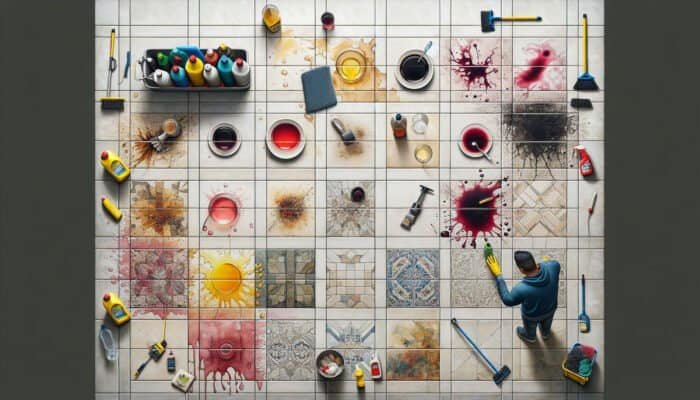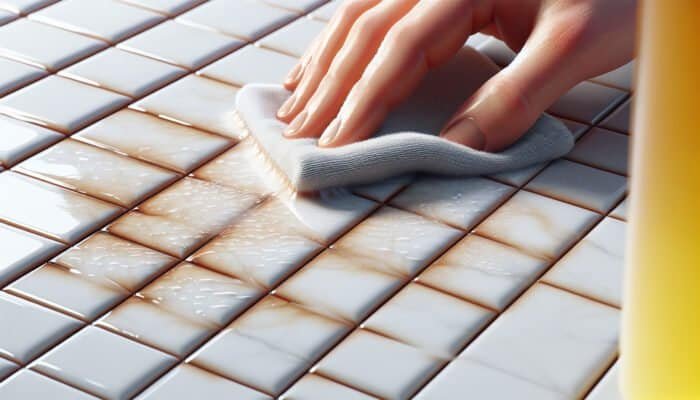Your Complete Resource for Mastering Porcelain Tiles and Expert Maintenance Strategies
Porcelain tiles are celebrated for their remarkable durability and exquisite aesthetics, making them a popular choice among homeowners across the UK for a range of flooring applications. To prolong the lifespan and improve the visual appeal of your porcelain tiles, it is essential to comprehend the unique attributes that distinguish them from other flooring materials. By understanding their unique manufacturing process and inherent properties, you can acquire valuable insights into the most effective cleaning methods tailored specifically for your tiles, ensuring they remain in pristine condition for many years to come.
Exploring the Diverse Styles of Porcelain Tiles and Their Unique Care Requirements

Porcelain tiles are available in a wide range of styles, each demanding tailored maintenance techniques. The most commonly utilised types include glazed, unglazed, and polished porcelain tiles. Glazed tiles possess a glossy, glass-like finish that not only enhances their aesthetic appeal but also effectively repels moisture and stains, making them especially suited for high-traffic areas. To maintain their stunning appearance, it is advisable to employ gentle cleansing agents that can remove dirt without harming the finish.
Conversely, unglazed porcelain tiles feature a more porous surface, which can absorb stains if not properly sealed. These tiles require additional care and respond best to a pH-neutral cleaner that cleans thoroughly without adverse effects. Polished porcelain tiles are favoured for their shiny, mirror-like finish, but they can easily show marks. Regular upkeep with appropriate products is vital to ensure they maintain their visual charm and prevent unsightly wear and tear.
Identifying the specific type of porcelain tile you possess is essential for determining the best cleaner for your porcelain floor tiles. Each variety reacts differently to cleaning agents, so tailoring your cleaning approach is crucial for achieving the best possible results.
Comparing Porcelain and Ceramic Tiles: Key Differences in Care and Maintenance
Although porcelain and ceramic tiles share certain similarities, there are significant differences that influence their cleaning requirements. Porcelain tiles are denser and fired at higher temperatures, resulting in superior water resistance and resilience. This inherent strength means that deep cleaning is less frequent, but it remains essential to use products specifically designed for porcelain to avoid unwanted build-up or damage.
Ceramic tiles, on the other hand, are comparatively more fragile due to their lower density, making them more susceptible to chipping and staining. Consequently, more frequent and thorough cleaning may be necessary, particularly in areas prone to spills, such as kitchens or entryways. When selecting the most effective cleaner for your porcelain floor tiles, remember that not all products suitable for ceramic tiles are appropriate for porcelain.
The Impact of Tile Composition on Effective Cleaning Strategies
The composition of your tiles significantly influences the most effective cleaning methods. Elements such as density and water absorption can vary between tile types, affecting how stains and dirt interact with the surface. Choosing the right cleaner is not only about achieving immediate results; it greatly impacts the long-term durability and appearance of your tiles.
Using harsh chemicals on unglazed tiles can cause irreversible damage, while even glazed surfaces can lose their shine if cleaned improperly. Therefore, understanding the specific type of porcelain you are working with when selecting the best cleaner for your porcelain floor tiles is critical. With the appropriate knowledge, you can ensure your tiles remain looking fresh and well-protected over the long haul.

Even the most meticulously cared-for porcelain tiles can start to exhibit signs of wear over time. Recognising common types of stains early and knowing how to treat them is essential for maintaining your floors in excellent condition and ensuring they remain visually appealing.
Identifying Common Stains on Porcelain Tiles and Effective Treatment Methods
Porcelain is incredibly durable; however, it is not entirely immune to stains. Frequent culprits such as grease, wine, food spills, and rust from metal furnishings can leave unsightly marks. Grease, particularly in kitchen environments, can seep into the surface if not cleaned promptly. Some spills, like wine, may be easier to address immediately, while others may necessitate stronger cleaning products and extra effort to eliminate.
The key to successful stain removal lies in first identifying the type of stain present. A porcelain-friendly degreaser may suffice for kitchen-related messes, while treating rust spots may require a specialised product. The quicker you respond to these situations, the easier they will be to resolve. Hence, having appropriate cleaning solutions readily available can significantly streamline your maintenance efforts.
Overcoming the Challenges of Grout Cleaning with Effective Solutions
Grout may not receive much attention, yet it plays a vital role in the overall aesthetics of your flooring. Due to its porous nature, grout tends to absorb dirt and stains more readily than the tiles themselves, which can render even the cleanest floors looking somewhat dingy.
To effectively manage grout cleaning, utilise a <a href=”https://london-stone.co.uk/tile-care/revive-ceramic-tiles-in-motspur-park/”>soft brush</a> along with a gentle yet efficient cleaning solution. Many individuals neglect grout maintenance, but regular care is crucial for maintaining a polished and uniform appearance across your flooring. Employing products specifically designed for grout cleaning can effectively eliminate stubborn stains while ensuring the surrounding porcelain remains unscathed.
Proven Techniques for Tackling Hard Water Stains on Porcelain Tiles

Hard water stains are a common irritation for porcelain tile owners, particularly in regions with high mineral content in the water supply. These stains can leave unattractive deposits that detract from the shine of your tiles. Routine cleaning with a vinegar solution can effectively dissolve these mineral build-ups; however, it is vital to ensure that your tiles are resistant to acidic cleaners to prevent any potential damage.
To treat hard water stains, use a soft cloth or sponge to apply a diluted vinegar solution. This approach is often effective for addressing these unsightly deposits. After treatment, be sure to rinse the tiles thoroughly with clean water to remove any residue that could lead to further staining, thus preserving the aesthetic appeal of your surfaces.
Effective Strategies for Removing Ink and Dye Stains from Porcelain Tiles
Ink and dye stains can be particularly difficult to remove from porcelain tiles, especially if they are allowed to set for an extended period. The key to successful removal lies in taking prompt and decisive action. Many homeowners find that applying rubbing alcohol to a soft cloth effectively lifts ink stains without harming the porcelain surface.
For more stubborn stains, consider using a commercial stain remover specifically formulated for porcelain tiles. Always conduct a test on a small, inconspicuous area first to ensure compatibility. When dealing with dye stains, it is crucial to choose products that are safe for your specific tile type, as some cleaners may cause discolouration or damage, jeopardising the integrity of your flooring.
Selecting the Most Suitable Cleaning Products for Your Porcelain Tiles
Choosing the right cleaning products is essential for effectively maintaining your porcelain tiles. The market offers a wide variety of cleaning solutions, each formulated with specific properties to address various cleaning needs.
The Advantages of Using pH-Neutral Cleaners for Optimal Tile Care
To safeguard the integrity of your tiles, pH-neutral cleaners are highly recommended. These products are specifically designed to cleanse without altering the chemical balance of your tiles, making them safe for regular use on both glazed and unglazed porcelain. They effectively eliminate dirt and grime while preventing any potential damage that more acidic or alkaline cleaners may cause.
When selecting a pH-neutral cleaner, opt for environmentally-friendly and biodegradable options. This not only ensures the safety of your tiles but also contributes to a healthier home environment. Consistent use of pH-neutral cleaners can significantly prolong the lifespan and visual appeal of your porcelain floor tiles, making them an excellent choice for conscientious homeowners.
Utilising Specialized Cleaners Designed Specifically for Porcelain Tile Maintenance
In the UK, numerous specialised cleaners have been developed exclusively for porcelain tiles. These products often feature unique formulations that target specific stains while remaining safe for the tile’s surface. Well-known brands such as HG and Fila provide targeted solutions that effectively address stubborn stains, including those caused by food and mineral deposits.
When selecting a specialist cleaner, it is vital to read labels carefully to ensure compatibility with your tile type. Some products may be better suited for indoor tiles, while others can also be used on outdoor surfaces. Professional-grade cleaners may offer enhanced effectiveness, but it is wise to adhere to the manufacturer’s instructions for optimal results.
Exploring Eco-Friendly Natural Cleaning Solutions for Sustainable Tile Maintenance
For those who prefer environmentally-friendly alternatives, natural cleaning solutions such as vinegar and baking soda can be remarkably effective on porcelain tiles. Vinegar, when diluted with water, can effortlessly cut through grime and restore shine to surfaces. Baking soda acts as a gentle abrasive, making it ideal for lifting stubborn stains without scratching the tile surface.
To use these natural cleaners effectively, mix equal parts vinegar and water in a spray bottle. For particularly stubborn stains, sprinkle baking soda directly onto the affected area, then spray the vinegar solution over it. Allow it to fizz for a few moments before wiping it away with a soft cloth, achieving a clean and revitalised surface.
The Benefits of Using Microfibre Cleaning Cloths for Exceptional Tile Care
When it comes to cleaning porcelain tiles, microfibre cloths have transformed the process. These cloths are designed to attract and trap dirt, dust, and grime, making them exceptionally effective for daily maintenance. Unlike traditional cleaning cloths, microfibre does not scratch the surface of your tiles, ensuring they remain unblemished and in pristine condition.
For optimal results, use a microfibre cloth alongside your preferred cleaning solution or even plain water. Regularly washing and reusing these cloths not only saves money but also helps to reduce waste, making them an excellent choice for environmentally conscious homeowners striving to maintain their flooring effectively.
Implementing Effective Cleaning Techniques for Porcelain Tiles
Successfully cleaning porcelain tiles involves more than merely selecting the right products. Employing the correct techniques is equally important for preserving the beauty and longevity of your flooring.
Establishing a Consistent Daily Cleaning Routine for Your Porcelain Tiles
Creating a daily cleaning routine is essential to keep porcelain tiles in optimal condition. Simple practices, such as sweeping or vacuuming, can help eliminate dust and debris, preventing scratches and the accumulation of dirt. For a quick refresh, a damp microfibre cloth can work wonders, ensuring that dirt does not build up over time.
In high-traffic areas, consider using a mop with a pH-neutral cleaner diluted in water for a thorough clean. This method not only aids in maintaining the tiles’ visual appeal but also protects against long-term damage caused by dirt and grime accumulation. Incorporating regular maintenance cleaning into your home care routine is crucial to ensure that your tiles remain stunning for years to come.
Implementing Deep Cleaning Techniques for Stubborn Stains and Grime
For those persistent stains and areas that need more intensive attention, deep cleaning methods are essential. Start by thoroughly vacuuming or sweeping to remove loose debris. After this, apply a specialist tile cleaner or a natural solution, such as a mixture of vinegar and water, to treat the affected areas.
Allow the cleaner to sit on the tiles for a few minutes before gently scrubbing with a soft-bristled brush. This approach helps to break down stubborn stains and grime. Rinse thoroughly with clean water to remove any remaining cleaner, ensuring the tiles do not become dull due to residual product build-up that could detract from their shine.
Cleaning Grout Lines for a Cohesive and Pristine Appearance
Grout lines can often reflect the cleanliness of your tiles, making effective grout cleaning essential for an overall polished look. Start by using a soft-bristled brush and a suitable grout cleaner or a paste made from baking soda and water. Scrub gently but firmly to lift stains without damaging the surrounding porcelain tiles.
It is advisable to rinse the area thoroughly after cleaning to remove any leftover cleaning agents. For ongoing maintenance, consider sealing your grout lines to prevent future staining and to facilitate easier cleaning. This proactive approach can significantly enhance the overall appearance of your porcelain tiles, contributing to a neater and more cohesive aesthetic.
Prioritising Safety and Precautions During Tile Cleaning
When cleaning porcelain tiles, prioritising safety is paramount. Taking appropriate precautions not only protects you but also ensures the longevity of your flooring, allowing you to maintain its beauty and functionality over time.
Utilising Protective Gear for Safe and Efficient Cleaning
Wearing protective gear, such as gloves and eye protection, is essential, especially when using potent cleaning agents. Many commercial cleaners can be harsh on the skin and may cause irritation upon contact. By donning gloves, you can prevent potential burns or allergic reactions, creating a safer cleaning environment for yourself.
For those using spray cleaners, eye protection is advisable to shield against accidental splashes that could irritate your vision. Implementing these simple protective measures fosters a more secure cleaning process, enabling you to focus on achieving sparkling, clean tiles without undue risk.
Preventing Damage to Your Tiles During the Cleaning Process
Certain cleaning methods may inadvertently harm porcelain tiles if not approached with care. For instance, abrasive scrubbers can lead to scratches, particularly on polished tiles. Always opt for soft cloths or brushes specifically designed for delicate surfaces to maintain the integrity of your flooring.
Moreover, avoid using acidic or alkaline cleaners on unsealed tiles, as these can cause discolouration or deterioration. Understanding the specific needs of your tile type is critical in preventing damage during cleaning, ensuring that your floors maintain their beauty and durability over time.
Safely Storing Cleaning Products for Longevity
Proper storage of cleaning products is vital for ensuring safety and maintaining their effectiveness over time. Store cleaners in a cool, dry location away from direct sunlight to prevent degradation. Keeping these products in their original containers with clear labels also makes it easier to identify usage instructions.
For households with children or pets, it is wise to implement child-proof locks on cabinets where cleaning agents are stored. This simple step can prevent accidental ingestion and create a safer home environment, providing peace of mind for all residents.
Ensuring Adequate Ventilation During the Cleaning Process
Good ventilation is essential when using chemical cleaners to avoid inhaling harmful fumes. Open windows and doors to create airflow, and consider using fans to help disperse any lingering scents or vapours. This practice not only protects your health but also aids in the drying process of your tiles after cleaning, thus promoting a safer overall environment.
When using powerful chemicals, it is prudent to wear a mask to avoid inhaling any irritants. Prioritising ventilation ensures a healthier cleaning environment, allowing you to clean effectively while safeguarding your well-being.
Emergency Procedures for Swiftly Addressing Spills and Stains
In the event of a spill, knowing how to respond promptly can prevent stains and damage to your tiles. First, contain the spill by using absorbent materials such as paper towels or cloths to soak up as much liquid as possible. Avoid rubbing, as this action can push the liquid further into the tile or grout, making it more difficult to clean.
Once the initial clean-up is complete, employ the appropriate cleaner for the specific type of stain caused by the spill, ensuring that the area is thoroughly rinsed afterward. Keeping a spill kit stocked with essential cleaning supplies can streamline this process, helping to ensure that your tiles remain pristine and well-maintained.
Considering Professional Cleaning Services for Comprehensive Tile Maintenance
While many homeowners prefer to undertake cleaning tasks independently, there are moments when enlisting professional cleaning services can prove advantageous. Knowing when and how to choose such services is crucial for maintaining the quality of your porcelain tiles.
Recognising the Right Opportunities to Seek Professional Cleaning Assistance
Hiring professionals can be especially beneficial when faced with extensive staining or when tiles have been neglected for a prolonged period. If your tiles have lost their shine despite regular cleaning efforts, a professional deep clean can effectively restore their original brilliance and vibrancy.
Furthermore, if you are dealing with a large area or require heavy-duty cleaning, professionals have access to advanced equipment and cleaning solutions that can achieve results that may be challenging to replicate at home. Their expertise can provide peace of mind, ensuring that your tiles receive the care they need.
Choosing a Trustworthy Cleaning Service for Your Porcelain Tiles
Identifying the right cleaning service for your tiles can significantly influence how well your floors are cared for. It is advisable to seek companies that come highly recommended within your local community and have specific experience with tile and grout cleaning. Specialists in this field will know how to treat porcelain tiles appropriately, utilising the right tools and methods to accomplish the task safely and effectively.
Reading online reviews and asking friends or neighbours for recommendations can provide you with a clearer picture of who is reliable and professional. It is also wise to ensure that the cleaners use gentle, tile-safe products to protect your floors during cleaning and achieve a superior overall result.
If you’re uncertain where to turn for trusted support, use our simple contact page https://london-stone.co.uk/contact/, and we can assist you in navigating the best options for your floor type and condition.
Understanding the Cost Factors Associated with Professional Cleaning Services
The cost of professional cleaning can vary based on several factors, including the size of the area and the extent of cleaning required. Typically, you can expect to pay between £20 and £40 per hour for cleaning services in the UK, depending on the provider and the specific services offered.
While this may seem like a considerable investment, consider the time and effort saved by hiring professionals, as well as the potential for achieving a more thorough clean than what might be possible through DIY efforts. Investing in professional cleaning can ultimately prolong the life of your tiles and enhance their appearance.
Essential Strategies for Preserving the Visual Appeal of Porcelain Tiles
To keep your porcelain tiles looking their absolute best, regular maintenance and proactive measures are crucial. Here are key practices that can significantly enhance the longevity and aesthetic appeal of your tiles.
The Importance of Regular Sealing in Safeguarding Your Tiles
Sealing your porcelain tiles is a vital step in protecting them from stains and enhancing their overall appearance. Although porcelain is inherently less porous than other tile types, implementing a sealing regimen provides an extra layer of protection against spills and stains, ensuring that your tiles remain beautiful for years to come.
It is advisable to consider sealing your tiles every 2-3 years, or as recommended by the manufacturer. This practice not only keeps your tiles looking pristine but also simplifies future cleaning, as sealed surfaces effectively repel dirt and grime, reducing maintenance efforts.
Implementing Strategies to Prevent Scratches and Wear on Your Tiles
Preventing scratches and wear on porcelain tiles requires a combination of cleaning practices and lifestyle choices. Using furniture pads beneath heavy items can help avoid scratches when moving them. Additionally, placing mats at entry points can significantly reduce dirt and debris being tracked onto your floors, which can contribute to wear over time.
Regularly inspecting your tiles for signs of wear is equally important. Promptly addressing any minor issues can prevent them from escalating into more significant problems that could detract from the beauty and functionality of your flooring, ensuring that your investment remains in excellent condition.
Techniques for Elevating the Shine of Your Porcelain Tiles
To truly enhance the shine of your porcelain tiles, consider incorporating polishing into your regular cleaning routine. Many commercial tile cleaners are designed not only to clean but also to impart shine. Applying these products as directed can restore the luster to dulled tiles and improve their overall aesthetic.
In addition to utilising specialised products, ensure that you buff your tiles with a clean, dry microfibre cloth after cleaning. This simple technique can help bring out the natural shine and keep your tiles looking brand new, contributing to a welcoming and polished environment in your home.
Commonly Asked Questions Regarding Porcelain Tile Care
What is the most effective method for cleaning porcelain tiles?
The most effective cleaning method involves regular sweeping or vacuuming, followed by mopping with a pH-neutral cleaner. For tougher stains, utilise a specialised cleaner formulated explicitly for porcelain tiles to ensure optimal results.
Is it safe to use vinegar for cleaning porcelain tiles?
Yes, diluted vinegar can effectively clean porcelain tiles. Mixing equal parts vinegar and water creates a safe solution that helps to remove grime and restore shine without causing damage.
How frequently should I deep clean my porcelain tiles?
Deep cleaning should be performed every 1-3 months, depending on foot traffic and the presence of stains. Regular maintenance is vital for preventing build-up and keeping tiles looking pristine and well-maintained.
Are there specific products designed for cleaning porcelain grout?
Yes, many manufacturers offer grout cleaners that are safe for use on porcelain. It is advisable to seek out products specifically formulated for tile grout cleaning to achieve the best results and maintain the integrity of your flooring.
What preventative measures can I take to avoid stains on my porcelain tiles?
Regular sealing, prompt attention to spills, and the use of mats at entry points can significantly reduce the risk of stains on your porcelain tiles, ensuring they remain clean and beautiful over time.
Is it safe to use bleach on porcelain tiles?
Using bleach is not recommended on porcelain tiles, as it can lead to discolouration or damage to the finish. Instead, opt for pH-neutral or tile-specific cleaners that are safer for your flooring.
How can I determine if my porcelain tiles need sealing?
If water droplets no longer bead on the surface and instead absorb into the tile, it is time to reseal your porcelain tiles to maintain their protective layer and ensure ongoing defence against stains.
What essential tools are needed for cleaning porcelain tiles?
Key tools for cleaning porcelain tiles include a soft-bristled brush, microfibre cloths, a mop, and a vacuum or broom. These tools are essential for ensuring effective and safe cleaning, contributing to the maintenance of your flooring.
Should I consider hiring a professional cleaner for my tiles?
It is advisable to consider hiring a professional if your tiles are heavily stained or if you require a thorough clean that exceeds regular maintenance capabilities. Professional cleaners can provide expertise and equipment that deliver exceptional results.
Is it permissible to use a steam cleaner on porcelain tiles?
Yes, steam cleaners can be safely used on porcelain tiles, but ensure that the tiles are sealed and always follow the manufacturer’s instructions for best results, thus preventing potential damage during cleaning.
The Article Finding the Best Cleaner for Your Porcelain Floor Tiles first found on https://london-stone.co.uk
The Article Best Cleaner for Porcelain Floor Tiles: A Quick Guide appeared first on https://fabritec.org
The Article Cleaner for Porcelain Floor Tiles: Your Essential Guide Was Found On https://limitsofstrategy.com

